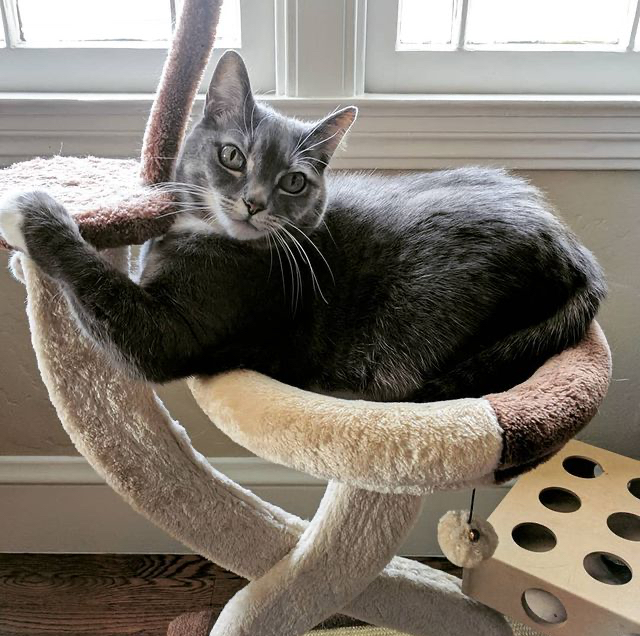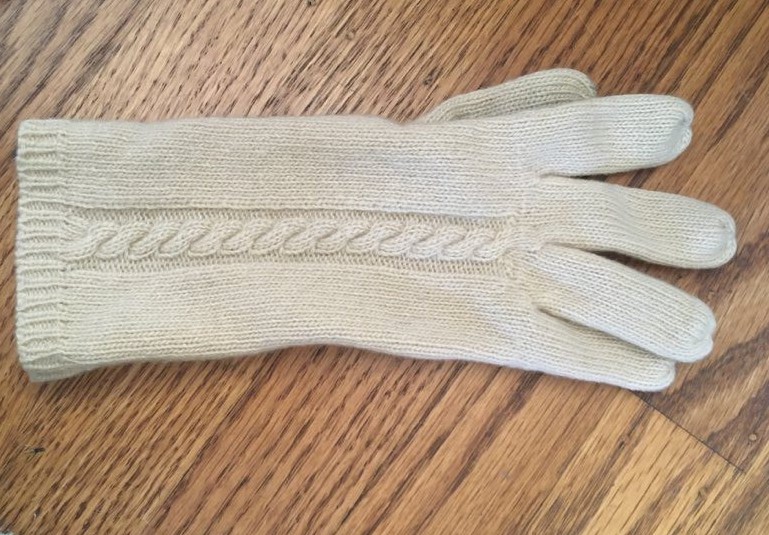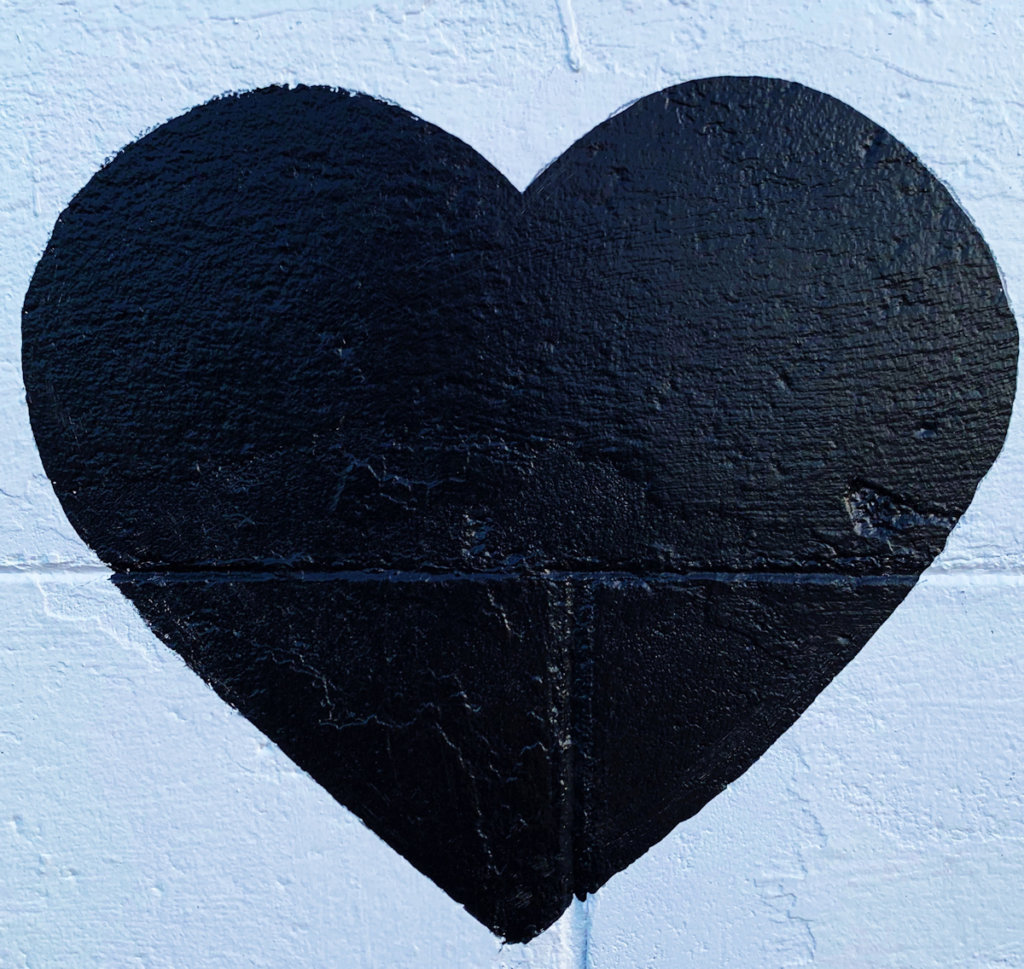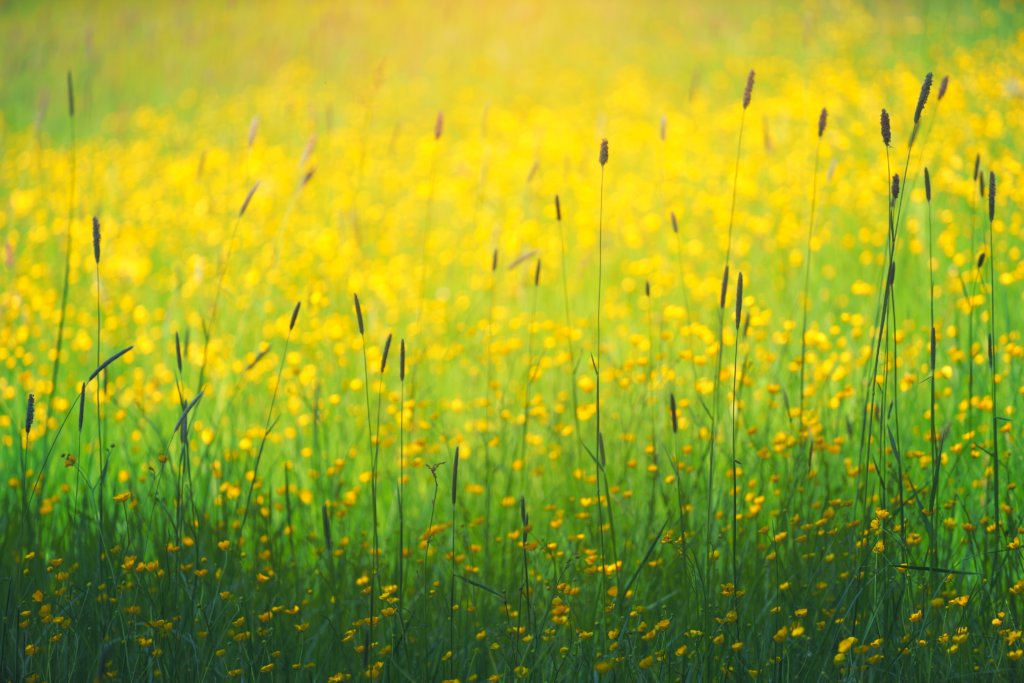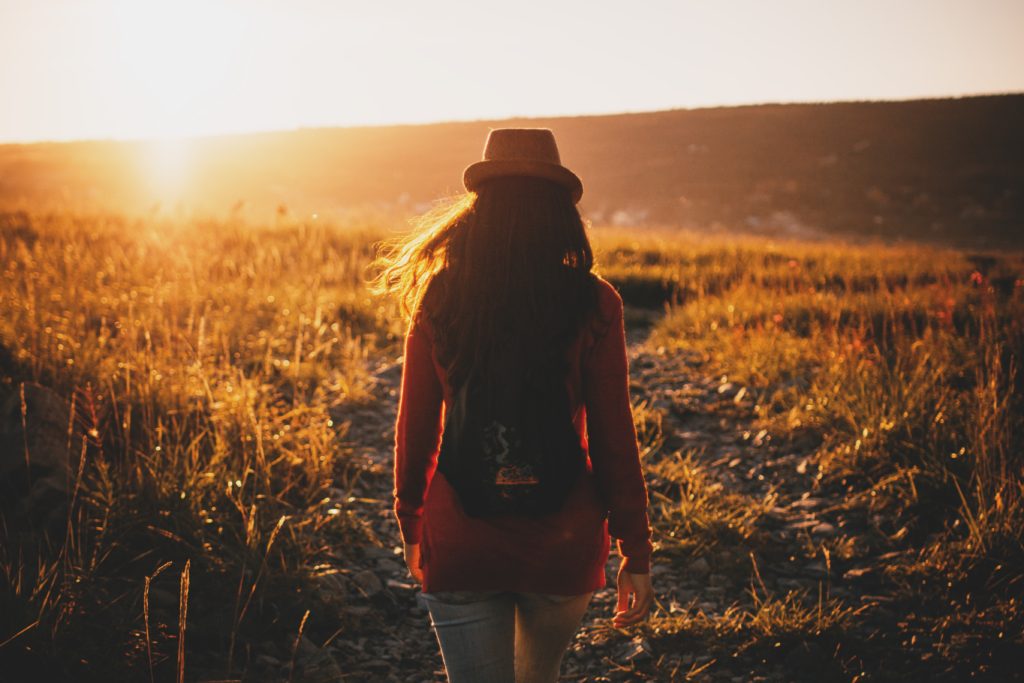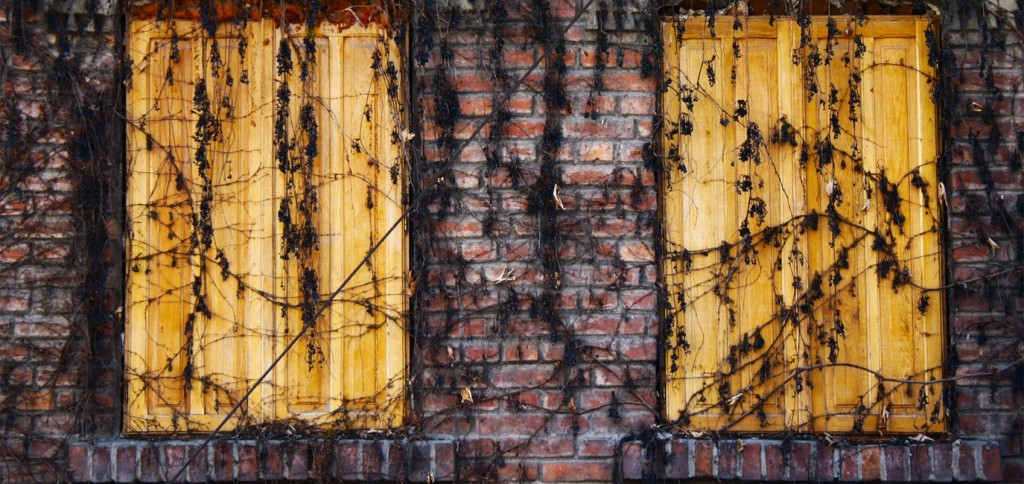I’ve been grieving and am reminded of a few things. One, grief is a portal, transporting us back to previous hurts that were not mourned. A dog dying may stir up grief about not only that dog, but childhood wounds of not feeling fully loved because the dog did what parents could not. The event (the dog’s death) is a portal, opening a way to previous losses as well. That’s why grief can feel so overwhelming, so outsized, because often it’s about a mix of things.
This is also true for me, and I have to say, I don’t love it. It’s not fun. And at the same time, I recognize I’m in a period of transformation. I’m letting go of old beliefs, outdated ways of behaving, and becoming someone new.
As if to underscore this point, the other day I had a strange dream. There was something stuck in my teeth and when I used my finger to pick it out, what emerged from my mouth was a fully formed, still alive, monarch butterfly that flew away. There was still something in my teeth so I again tried to pick it out and again what emerged was a fully formed, still alive blue butterfly.
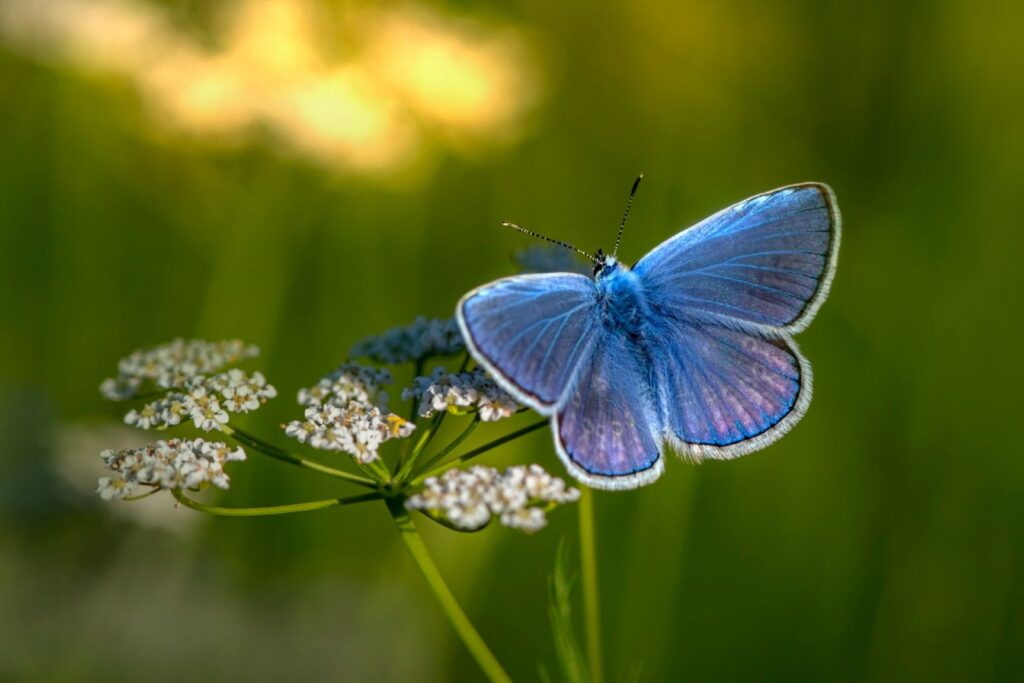
The butterfly looked almost identical to this one. Photo by Erik Karits on Unsplash
I asked ChatGPT to interpret my dream and it said the following:
Butterflies in dreams are classic symbols of transformation, renewal, and the soul. They represent something beautiful and alive emerging after a period of constriction or gestation. The fact that they were in your mouth is especially meaningful:
- The mouth is about communication, expression, and speaking your truth. Butterflies flying out could symbolize words, truths, or parts of your authentic self that have been trapped or silenced—now ready to come alive and take flight.
- Something was “caught” in your teeth — a feeling of being stuck, caught between holding in and letting out. When you finally touched it, instead of decay or debris, life and beauty It suggests that even what feels clogged or heavy in you (your grief, longing, sorrow) holds something transformative.
Colors matter:
- Orange butterfly: Often linked with vitality, creativity, joy, it could represent life-force returning through expressing your emotions.
- Blue butterfly: Blue is associated with peace and clarity. A blue butterfly flying out of your mouth could symbolize your voice being freed, your truth finally spoken, or words of healing coming through you.
Putting it together:
Your psyche may be showing you that even though it feels like you’re drowning in rubble right now, the very act of giving voice to what’s inside you—the tears, the grief, the raw truths—will lead to beauty and transformation. What you’re releasing isn’t ugliness or shame, but life, color, and freedom. Almost like your grief, when expressed, becomes medicine. Your voice, even when heavy with longing, is birthing transformation.
And finally: “It feels like a message that nothing is wasted. Even the painful stuff you’re trying to get out of your system has wings.”
Oh man. Even the painful stuff I’m getting out of my system has wings! How beautiful is that? So often, we think of releasing pain as something toxic, something to be rid of, to walk away from. But what if it’s not? What if the painful thing has wings? What if it’s actually something beautiful and sacred?
As a writer, I alchemize pain and turn it into art. The negative experiences I’ve had fuel my writing. I place it on the page so that others feel less alone. In my spiritual tradition, we talk about the power of art to inspire and transform others. My spiritual teacher says, “People seek deliverance from the whirlpools of darkness; they aspire to illuminate their lives and minds with ever-new light. In all their actions, in all their feelings, there is an inherent tendency to move forward; therefore, if at all they are to be offered something, the creator of art cannot remain idle or inert.”
Rather than being idle or inert, I’m taking all of the pain, all the grief, all the disappointment, and letting it transform me, and perhaps inspiring others along the way.
I dream of a world where we understand grief is a portal, opening the door to the past. A world where we recognize pain isn’t necessarily something toxic to run away from. A world where we understand sometimes pain can turn into something beautiful and transformative.
Another world is not only possible, it’s probable.
This weekend I had a small taste of what other people have been experiencing for the past year with this pandemic. Serenity, a cat I love and the closest I’ve come to a pet since I moved out of my parents’ house, died. Under normal circumstances, I would have been able to say goodbye to her in person but because of the pandemic, I said goodbye over Facetime.
I’m grateful I had the opportunity to say goodbye at all, but I would have much rather been able to pet her one last time. There are numerous crappy things about this pandemic but the worst, emotionally speaking, is the feeling of being alone. We already know this because we’ve experienced it ourselves, and I’m sure you’ve seen the news articles about the increase in mental health issues such as depression and anxiety during this pandemic. Grief is also something meant to be shared, and ideally in person. Online memorials and the like are better than nothing, but they’re not the same as in-person events.
I keep thinking about an article I read in the Atlantic nearly a month ago detailing Bhutan’s experience during this pandemic. It has me wondering, what would life be like in the U.S. if we followed Bhutan’s example? Would I have been able to say goodbye to Serenity in person?
As of late February, Bhutan only had one death from COVID-19. Not one death that day or week, one death period. Madeline Drexler writes nations like Bhutan, because there are others with low death rates, “offer plenty of lessons, from the importance of attentive leadership, the need to ensure that people have enough provisions and financial means to follow public-health guidance, and the shared understanding that individuals and communities must sacrifice to protect the well-being of all: elements that have been sorely lacking in the U.S.”
However, what struck me the most about the article is that the country made it possible for people to follow public-health guidance by providing economic and social support to those who need to quarantine or isolate. And furthermore, the king of Bhutan explicitly told government leaders that “even one death from COVID-19 would be too much for a small nation that regards itself as a family,” Drexler wrote.
Look, I know Bhutan is smaller than the U.S., that the politics are different, etc., but what would it feel like to have a sense we’re all in this together instead of every person being out for themselves? If the government just says “stay at home” but doesn’t offer support for doing so, we wind up with a situation like we currently have.
What would it be like if we all adopted Bhutan’s worldview that we’re one big family? That it was our responsibility to care for and protect our family members? How would we behave differently? I suspect it would be a much more enjoyable experience for us all.
I dream of a world where we care about ourselves and each other. A world where we recognize our actions have consequences even if they’re not readily apparent. A world where we remember we’re not alone even if it feels that way sometimes. A world where we embrace the idea we are one big family.
Another world is not only possible, it’s probable.
I feel a little discombobulated. On the one hand, it’s Rosh Hashanah, the Jewish New Year, and a time for celebrating. I am celebrating – I’m celebrating that the sky has cleared, I can see the sun again. I’m grateful for my friends, family, and community. I’m taken aback but also profoundly grateful that my business is thriving. There’s a lot to be grateful for.
On the other hand, I’m deeply troubled by what’s happening in the world: the rise in fascism, environmental catastrophes, and oh yeah, a global pandemic, which has not only killed numerous people, but has also led to unemployment and food insecurity. There’s a lot to be concerned about.
I’m reminded here this is always how life has been. Joy is frequently mixed with sorrow and we see that even in Rosh Hashanah services. There’s a part called the Mourner’s Kaddish where the entire congregation holds space for those who have lost loved ones during the past year. People call out the names of loved ones who have died so everyone can bear witness to their grief.
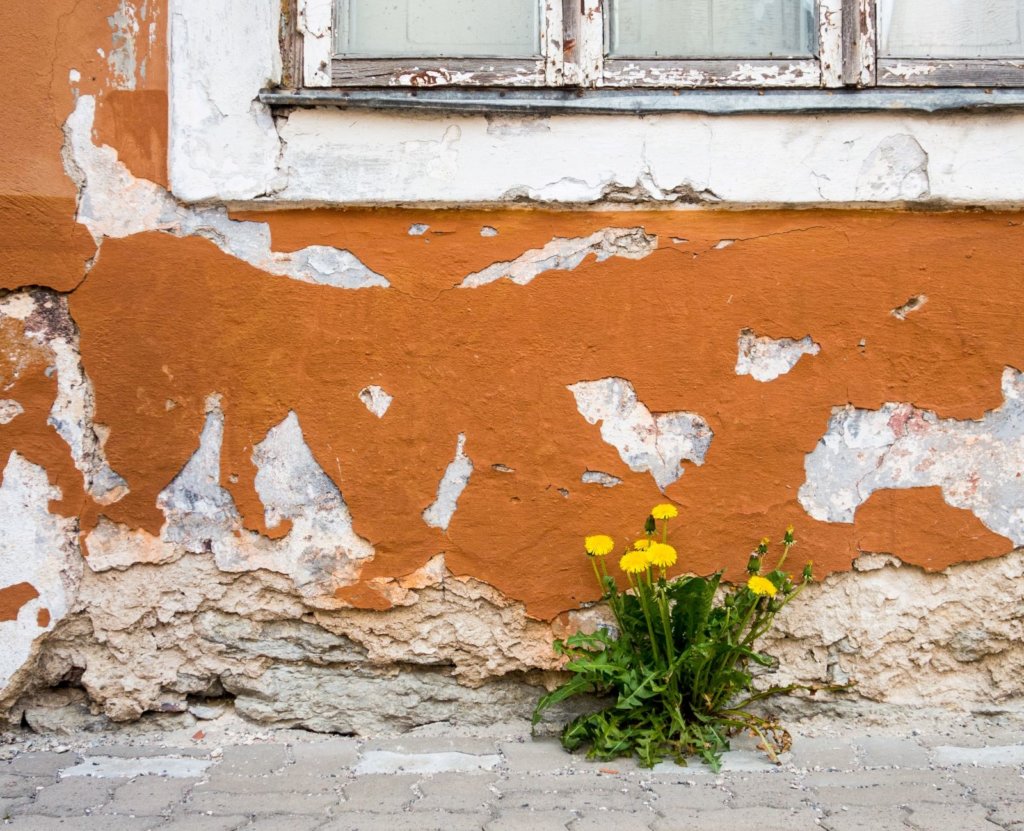
There can be beauty even amidst desolation. Photo by Nikola Johnny Mirkovic on Unsplash
As someone who is prone to black and white thinking, I presume my emotions will operate the same way: I’ll feel ecstatically joyful without any hint of sorrow. But again, that’s not true. This year as all of us are bombarded with one terrible piece of news after another, I continue to pursue joy and cling to it like a buoy in the sea.
I’m reminded here of a poem by Jack Gilbert titled “A Brief For The Defense” that seems especially relevant:
Sorrow everywhere. Slaughter everywhere. If babies
are not starving someplace, they are starving
somewhere else. With flies in their nostrils.
But we enjoy our lives because that’s what God wants.
Otherwise the mornings before summer dawn would not
be made so fine. The Bengal tiger would not
be fashioned so miraculously well. The poor women
at the fountain are laughing together between
the suffering they have known and the awfulness
in their future, smiling and laughing while somebody
in the village is very sick. There is laughter
every day in the terrible streets of Calcutta,
and the women laugh in the cages of Bombay.
If we deny our happiness, resist our satisfaction,
we lessen the importance of their deprivation.
We must risk delight. We can do without pleasure,
but not delight. Not enjoyment. We must have
the stubbornness to accept our gladness in the ruthless
furnace of this world. To make injustice the only
measure of our attention is to praise the Devil.
If the locomotive of the Lord runs us down,
we should give thanks that the end had magnitude.
We must admit there will be music despite everything.
We stand at the prow again of a small ship
anchored late at night in the tiny port
looking over to the sleeping island: the waterfront
is three shuttered cafés and one naked light burning.
To hear the faint sound of oars in the silence as a rowboat
comes slowly out and then goes back is truly worth
all the years of sorrow that are to come.
As we are all grappling with all the injustice in the world, all the destruction, all the grief, I encourage you to also have the stubbornness to accept your gladness. To find joy when and where you can because the world isn’t one way or another – it’s both, it’s all of it, it’s everything. I’m not advocating spiritual bypassing or whitewashing the horrors in the world. No. Instead I’m advocating feeling your feelings, recognizing it’s true life can be terrible, but also recognizing it’s true that there are babies laughing, flowers blooming, and lovers dancing. That life can also be joyful even in the most horrendous of circumstances. Life, and people, are complicated like that.
I dream of a world where we embrace delight. A world where we recognize joy can be mixed with sorrow. A world where we find the beauty in the world as a tonic to our hearts, reminding us there’s more to life than tragedy. A world where we celebrate as we grieve.
Another world is not only possible, it’s probable.
(First off, I want to say even though I’m not writing about Black Lives Matter this week doesn’t mean I no longer care or it’s not on my mind. It is. Being a human being means I care about many things all at the same time. In addition to everything going on in the world, things still happen in my personal world, and that’s what I’m writing about today.)
On Saturday, I stuffed cream, cashmere gloves into my jacket pocket in preparation for my trip to the grocery store. I like to wear gloves when I know I’ll be encountering high-touch surfaces because it saves me from washing my hands. About six minutes in to my walk to the store, I noticed the gloves had escaped my pocket. I stopped in my tracks and did an about face, retracing my steps while scouring the sidewalk and the street for my gloves. I found one and kept looking. I walked all the way back home and didn’t find my other glove.
Because I still needed groceries, I turned around again and kept my eyes trained on the ground looking for my glove. Didn’t find it. After leaving the grocery store, I once more swept my eyes left to right, constantly looking for my other glove. If you’re keeping track, that’s three times I searched for my glove to no avail.
When I came home, I took a picture of my glove and uploaded it to Google for a reverse image search, to see if I could purchase the gloves again. Nope. Then I messaged three different people on Etsy to ask if they could make me a match. If that wasn’t enough, later in the evening, just for kicks, I searched the street two more times and came up empty. If it wasn’t obvious, I have trouble letting go. Not only of objects, but also of people and situations. Goodbyes are hard for me.
I try really hard to fix things so I won’t need to feel sad. In this case, if I found my other glove I wouldn’t feel sad or upset because the problem would be solved. I think it’s safe to say my other glove is gone. Tears are pricking my eyes even typing that. I don’t want it to be true but reality is like that. In real life, not everything can be fixed or solved. Even buying a new pair of gloves won’t truly replace the one I lost. A new pair won’t make up for what’s missing. I’m allowed to feel sad about that.
My therapist tells me frequently emotions are like tools and when they show up, use them. When sadness shows up it’s because of a loss. I’ve lost many things in my life and I don’t think I’ve properly grieved them all. I was too busy metaphorically combing the street trying to solve the problem to cry. But here’s the thing about grief – it doesn’t go anywhere. It stays in the body. It may express itself as lung trouble, or pain in the back, or weight gain, or something else, but grief sticks around until it’s felt.
This isn’t a profound post or fiery one or philosophical one. It’s a human one. I’m a human being and when I lose something, I feel sad whether I let myself cry about it or not. What I’m learning is life is easier when I let myself grieve. How much time and trouble could I have saved on Saturday if I had given in to the emotion I felt instead of fighting it? I don’t regret looking for my glove, but now that I know it’s not coming back, it’s time to grieve. Not only for my glove, but for other things too.
I dream of a world where we let ourselves cry when we lose something or someone. A world where we recognize emotions are not meant to be fixed but rather felt. A world where we let ourselves feel our feelings when they come up. A world where we embrace our humanness.
Another world is not only possible, it’s probable.
This weekend held a wide range of emotions from the high to the low. On Saturday I went to a bachelorette party for one of my closest friends. We lounged by the pool, chatted, and generally celebrated her impending marriage. It was a joy to spend time with her and other close friends of hers for the sole purpose of having fun. But I had another event this weekend and it was not a bachelorette party.
A family friend of mine passed away a couple of weeks ago and it’s sent shockwaves through my community. I say that because no one could have guessed he would have passed away. He was one of the most healthy, vibrant people I knew. When I think of him, I see him with a huge smile on his face, beaming out joy to the world. He was the same age as my parents so his death has me confronting their mortality as well. Layered on top of that, I grew up with his daughters so his death hits me in another way that’s hard to express. Sunday was his memorial service and I cried through most of the ceremony.
But here’s the interesting part: joy and sorrow get to coexist within me, within us. Even during the memorial service we could hear his grandchildren laughing and playing in the background. It reminded me both emotions can be present. That joy and sorrow can be like the yin yang symbol with a little bit of white in the black and a little bit of black in the white. In my experience life is like that. Attending a wedding can bring up grief about being single. A funeral can bring not joy, but appreciation at reconnecting with friends, even if the circumstances are sad. This weekend was a study in that for me — pairing joy with sorrow.
Two years ago I wrote a poem about a similar experience following the death of a coworker called “Big Enough for Both:”
Big enough for both
Grief and celebration
A funeral and a wedding
Loss and gain
Hurting and healing
All at once
Altogether
Everything
Everything
Everything
That’s what life is like for me right now, maybe for all of us. It’s heartbreaking and heart-gladdening. It’s happy and sad. It’s frustrating and peaceful. It’s everything all at once. I want to parse things out and say, “Now is a happy time and now is a sad time,” but my life isn’t like that. It’s messy and chaotic and unpredictable. As I contemplate how to end this post, I can see my friend with a big smile on his face saying, “Don’t worry, it’s fine,” as in, I don’t have to make sense of it all, I don’t have to try to change life or circumstances. I can be here, in the moment, accepting everything.
I dream of a world where we understand life is messy, chaotic, and unpredictable — not only in terms of circumstances but also in emotions. A world where we realize the yin yang is an excellent portrayal of our experiences. A world where we understand that oftentimes joy is paired with sorrow and vice versa.
Another world is not only possible, it’s probable.
Almost exactly a year ago, my coworker died unexpectedly. The news hit me harder than I anticipated, particularly because we weren’t close. Now a year later, my heart still twinges with grief. My company has long since replaced him – someone new writes for us – but in reality people are not like auto parts and therefore not replaceable.
I notice in American culture we tend to believe the opposite; we commodify others, especially in the context of romantic relationships. How often do we say to someone after a breakup, “You’ll meet someone new”? As if the new person will act like putty and exactly fill the vacant space? I realize it comes from a well-meaning place, but Eric’s death shows me how not true this perspective is, for me anyway. We hired someone to literally fulfill all the duties Eric left open, but the new guy is no Eric. He performs his job well, but he’s not a replica of Eric.
Going back to dating, I notice the same thing – I still miss certain things about my exes. Each new man brought something different to the table, but they didn’t erase the person before. Instead of acting like putty, each person has a place in my heart that is theirs and theirs alone, but they share the space with others. No one is forgotten, and no one is replaced, including me. Up until about two years ago, I feared once I died it would be like I never existed, which I think stemmed from inherited family trauma. On my mom’s side, almost all of my relatives were killed in the Holocaust. Entire swathes of my family are a big question mark. In some ways, it’s like they never existed because I know nothing about them, but it’s not true: They did exist.
Even though I don’t know the names of my distant relatives, they still existed. They still impacted the people around them, including those who survived. And their loss still left a mark. Eric’s loss still leaves a mark. It always will because he’s not some cog in a wheel I throw away once it stops functioning.
My spiritual teacher says, “If one ant meets a premature death, it will disturb the balance of the entire cosmos. Therefore, nothing here is unimportant, not even an ant.” I don’t think I fully imbibed that statement before. Today I understand it on a whole new level – how each and every being is important, significant. Even the overlooked and often maligned ant is precious, loved, important. Each person, each relationship, be it personal or professional, is special. It’s a disservice to ourselves and others to pretend differently.
I dream of a world where we realize each person is irreplaceable. A world where we realize each relationship occupies a place in our heart. A world where we understand every living being is important and precious.
Another world is not only possible, it’s probable.
A few weeks ago I flew back to North Carolina. I visited the place of my childhood and found everything to be slightly familiar, but altogether vastly different. My childhood home burned down and in its place stood tall trees, grass, and shrubs. My elementary school also no longer exists. My favorite place (the library, of course), closed and moved to a new location. Walking around I couldn’t comprehend all the changes because in my mind, things stayed exactly the same. It’s a dangerous thing to only live in your head and not see reality for what it is.
I think part of what we’re experiencing here in the U.S. is the dichotomy of delusion and reality. On one side, we have people (like those in power) who lie ceaselessly, who convince themselves something is true when it’s false. My sister reminded me during our North Carolina visit that we live in a post-truth world. That’s why we have such a thing as fake news. It’s nothing new, propaganda has existed for ages, but now we’re seeing it more and we’re fighting it more. It’s important for me as a journalist and a yogi to stick to the truth as closely as possible.
In Sanskrit, the unchangeable entity is Sat. The external manifestation of Sat is satya, or benevolent truthfulness. My spiritual teacher said, “Only satya or truth triumphs and not falsehood. Whenever there is a clash between truth and untruth, truth’s victory is inevitable. … Untruth, being a moving phenomenon, may attain a temporary victory on its march, but never a permanent one. … Falsehood does not win because it is relative, it is ever-changing.”
I bring this up because I think it’s important to acknowledge a truth about the United States. With every atrocious thing spewing from the current administration, people say, “This isn’t the real U.S. This isn’t the U.S. I know and love.” Oh, but it is my friends.
As much as we don’t like to admit it, the United States was founded on horrors similar to what we’re seeing now. We decimated Native American tribes. We regularly separated black people from their families under the guise of economic progress. Our country, the land of the free and the home of the brave, always carried a footnote, which is those things were true only for some. Our current president is carrying on the imperialist tradition. That’s not to say all Americans feel the way he does. It’s also not to say the U.S. hasn’t made great strides in equality for people of color, for women, for various sexual orientations, etc., because it has. But it would be disingenuous to say the behavior of the people in power in the current administration is “un-American.”
What does this have to do with my visit to North Carolina? Being there I gained more perspective of my past and was able to see a fuller picture. I finally saw the truth, and as the saying goes, the truth set me free. I’m grieving all that I lost, but first I had to see it. Until we collectively recognize our country’s racism, sexism, and prejudice, we’ll never be able to move forward. Until we see our true selves, our true past, we’ll never be rid of it. We’ll never be free.
My spiritual teacher is an optimist, and so am I. I know one day we will all be free. That no matter our immigration status, the color of our skin, our gender, our sexual orientation, or anything else, we will receive equal treatment. But first, we have to tell the truth.
I dream of a world where we remember the truth will prevail. A world where we stamp out falsehood and come to grips with reality. A world where all people are treated with love, kindness, and respect. A world where each person is valued for the beautiful and precious beings they are.
Another world is not only possible, it’s probable.
What a week. Lots of grief on a societal level, but also a personal one. I’m reminded of how human we are. Of how we’re all in this together. As Ram Dass says, “We’re all just walking each other home.”
His quote kept ringing through my head this week. In times of trauma and grief, I want to do something. Sometimes there are actions to take, but sometimes all we can do is hold each other while we cry.
With painful feelings, I’ve often wanted someone else to take them away. To siphon them off as they would drink the last of a milkshake. I wanted someone, anyone, to make me feel better. Speaking as someone with loads of experience trying to escape her feelings, I can say without a doubt the answer is “That’s not possible.” No one else can cry my tears for me. No one else can take away my pain. Other people and things may distract me for a while, but just as with storm clouds, they darken the sky whether I acknowledge them or not.
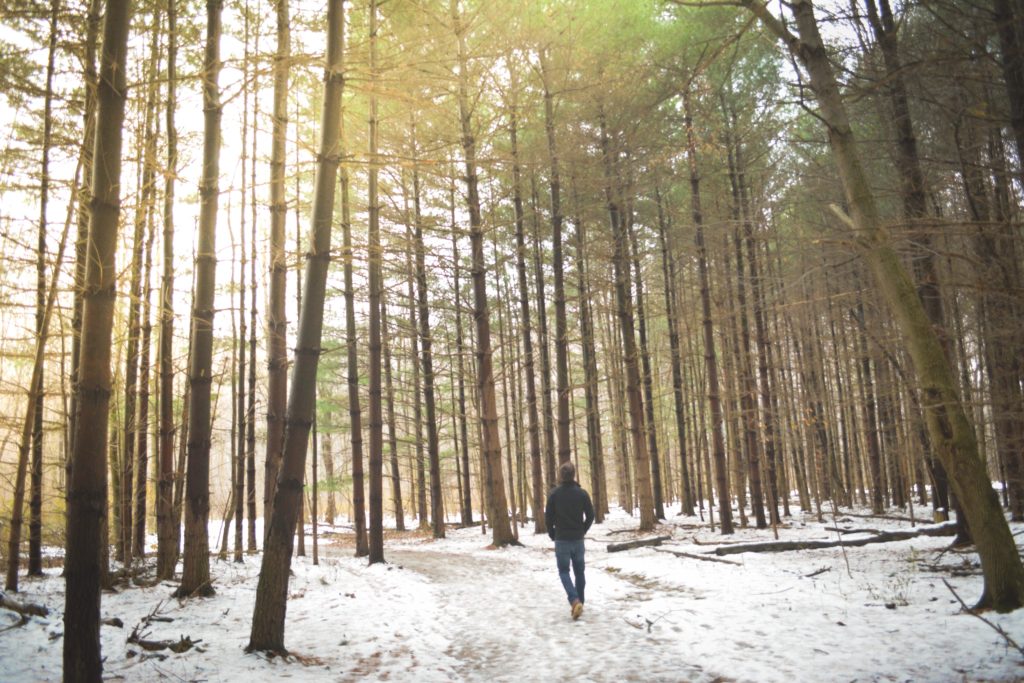
Walk with me? Photo by Hannah Donze on Unsplash.
Ram Dass’ quote reminds me no one is supposed to take away my pain and sorrow because we are all humans. We are not machines. We can’t write a code that says, “We will never feel sad ever.” Furthermore, it’s no one’s responsibility to make me feel better. We are fellow companions on this path. We are pilgrims going on a pilgrimage. There may be times I sprain my ankle and have to rely on others for help, but the responsibility for forward motion is still mine, and the responsibility to move through my emotions is still mine.
My spiritual teacher says, “[A] true society is like a group of pilgrims who attain a deep psychic affinity while traveling together, which helps them solve all the problems in their individual and social lives.”
That’s us. A group of pilgrims traveling this rocky path together. I’m speaking in metaphors a lot in this post, but what I’m trying to get at is it’s not my responsibility to solve or fix someone’s emotional state, or vice versa. I don’t have all the answers, or any of the answers, really. I can’t tell a person how to live their life or what they should do to feel better. All I can do is say, “I hear you and I’m beside you. I’m walking this path with you as a companion.” And that’s it. We’ll address problems as they arise – blisters, sprained ankles, etc. – but the emotional states? I’ll be with you during them, but the tears are still yours to cry and the steps are still yours to walk. And maybe that’s enough.
I dream of a world where we recognize we are all pilgrims on a pilgrimage. A world where we sit with each other when we’re in pain. A world where we realize all we can do is be there for each other. A world where we remember we’re all just walking each other home.
Another world is not only possible, it’s probable.
Last week, I wrote about the death of a colleague. In addition to grieving, I’m learning a lot about intimacy.
So often when I think about intimacy, it’s in the context of a romantic relationship, but the truth is, intimacy is not confined to a romantic partner. Real intimacy is like unzipping yourself and displaying your insides, and that can be done with anyone, something I’ve witnessed in this process.
As I share the news about my co-worker’s death, people react in different ways. Some people allow me to cry without offering a diversion or attempting to fix it. Other people become discomfited and say a quick, “I’m sorry,” before moving on to another topic. I’m not deriding people for their reactions – people are where they’re at and will respond how they do. What I notice though is in order to share my feelings with someone else, to be intimate with them, I have to acknowledge my feelings first. If I’m uncomfortable feeling sad, there’s no way I can share that with someone else because I’m shutting the feelings down internally. Someone else may be more than willing to share and connect with me, but if I’m not connected to myself, no one else can connect with me either.
We hear often, “You can’t give what you don’t have,” but I’m a concrete gal and I like examples. As an example, if someone asked me for oranges right now, I’d have to shake my head and say, “Sorry, I don’t have any.” Similarly, I can’t give intimacy if I don’t have it internally.
We think of intimacy and love as “out there,” something to find or force. I can’t tell you how many times I’ve complained about certain men in my life, lamenting that they’re not opening up, as if they were clams I could pry open. I’ve craved intimacy, but it’s only been within recent years I’ve created it internally by embracing all of my emotions. By giving myself space to feel.
Love and intimacy get presented as if we could walk into a store and buy them. We don’t realize intimacy is something we create, something we work on internally. I could be in relationship with the most amazing person, someone who loves intimacy, but if I’m not in touch with my own feelings, if I’m not allowing myself to feel them, we won’t have intimacy. It will be like talking to a brick wall. I say this because that’s also been my experience in grieving. When I share my insides with people who are discomfited, it’s like I threw an egg against a brick wall – my insides are smeared, on display. There’s no reciprocity, only impact. When I share my insides with people who are comfortable with emotion, it’s like I threw an egg at a cloud of cotton – I feel held, comforted, and supported.
Matt Licata, a psychotherapist I follow, synthesizes this concept well:
When all is said and done, perhaps there is no secret to co-creating a fulfilling, supportive, mutually beneficial intimate relationship, as it is always in the end a movement of the unknown. Healthy intimacy is not something you will figure out one day by way of some checklist or magical formula, but something you are asked to live in each moment, in all its chaotic glory. By learning to take care of yourself, you are creating a foundation upon which the mysteries of intimacy can come alive within and around you, providing a crucible like no other for the great work of aliveness that you have come here to embody.
I dream of a world where we embody our emotions. A world where we understand intimacy is not something “out there,” but rather “in here.” A world where we recognize intimacy is not something we find, but rather something we create. A world where we realize intimacy beings with us.
Another world is not only possible, it’s probable.
I know “little death” traditionally refers to the sensation of orgasm as likened to death, but not always, and that’s not what I’m writing about here. The little deaths I’ve been experiencing are the transformations taking place in me. I’ve been doing my work – going to therapy, taking care of myself, facing my demons – and the person I am now is not the person I once was. I’m behaving in new ways and thinking in new ways. These are positive changes, but it doesn’t mean I’m not sad, because I am. A part of me has died.
My spiritual teacher says, “Death is nothing but change. A 5-year-old child is transformed in due course into a 15-year-old boy. In 10 years, the child becomes the boy. Thereafter, you will never be able to find the body of the 5-year-old child. So the child’s body has certainly died.” He then goes on to mention the boy growing into a man, and then hitting middle age, then old age, until he finally dies and says, “The rest of the changes we do not call death; but in fact, all the changes qualify as death.”
All the changes qualify as death because the person that used to exist cannot be found anymore. And while I’m not a girl becoming a woman, I have still undergone transformations and probably will continue to do so throughout my life. I will die many times. We all will. Through my work in therapy, I’m learning it’s important to grieve for these old selves. To feel a sense of loss for the person I once was and can no longer be. The sadness exists and doesn’t go away through any rationalization on my part, nor any amount of looking on the bright side. It’s important for me to honor and say goodbye to the person I once was, just as it’s important to honor and say goodbye to other people when they die.
What I’m getting at here is we’re constantly undergoing a metamorphosis and it’s important to recognize that. We’re constantly dying and being reborn. But how often do we cry about it? How often do we let ourselves feel bereaved over no longer existing the way we did before? It’s just as much of a loss as other deaths and it’s just as important to cry about it.
I’m going to end by quoting a song from one of my favorite musicals, Forever Plaid, called “Cry:”
If your heartache seems to hang around too long,
and your blues keep getting bluer with each song,
remember sunshine can be found behind a cloudy sky.
So let your hair down, and go on and cry.
I dream of a world where we cry for all the little deaths we undergo. A world where we honor all past versions of ourselves by allowing ourselves to feel grief. A world where we remember sunshine can be found behind a cloudy sky, so we let ourselves go on and cry.
Another world is not only possible, it’s probable.
